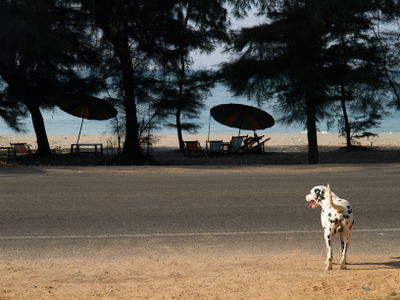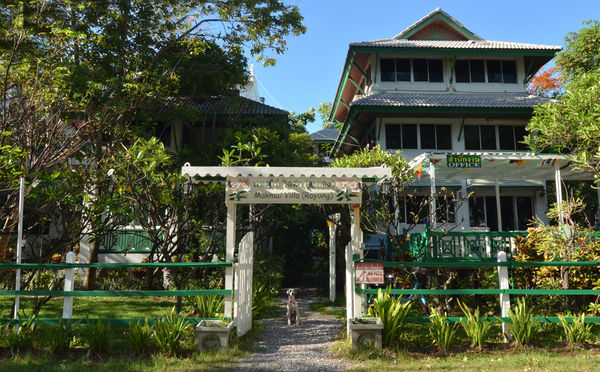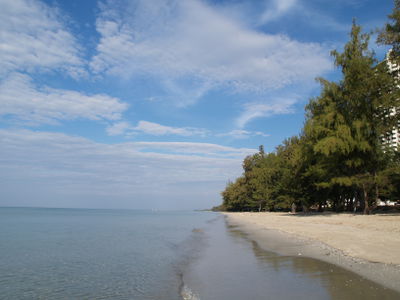8th South-East Asian Summer School on Computational Logic
The lecture slides will be online. You can find them under 'lecturers and lectures'.
From July 16 to July 30, 2016, we organize the 8th ICCL summer school. The summer school will be held in in Rayong, Thailand and is supported by the
German Academic Exchange Service (DAAD). The summer school is done in cooperation with the cluster 'semantic technologies' of the Erasmus Mundus Action 2 project swap and transfer.
The first summer school has been held 2005 in HUT, Vietnam and the second summer school has been held 2006 in UI Jakarta, Indonesia. The summer schools in 2007 and 2014 have been held in Vietnam and the summer schools in 2008, 2010 and 2012 have been held in Indonesia again.
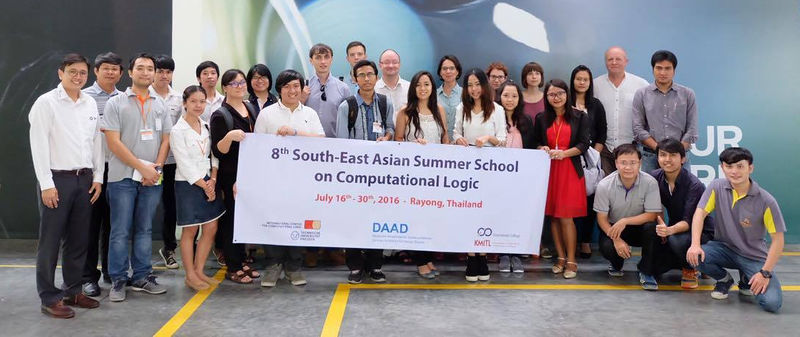
The summer school is a platform for knowledge transfer within a very rapid increasing research community in the field of "Computational Logic". We will offer introductory courses covering the fundamentals of reasoning, courses at advanced levels, as well as applied courses and workshops dedicated to specialized topics and the state of the art.
A limited number of scholarships for bachelor, master and phd students will be available!
Dates
- Arrival: 16th of July
- Departure: 30th of July
Venue
The summer school is held at the Makmai Villa Resort.
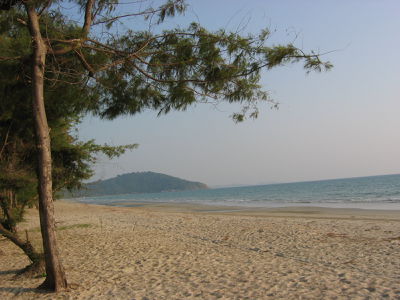
Tableau Calculi and Applications by Prof. rer. nat. habil. Ulrich Furbach (Universität Koblenz-Landau, Germany)
This course will cover first order tableau calculi with a focus on hyper tableaux. The calculus rules together with a comparison to other logical systems are introduced and an extension for an efficient handling of equality is given. Various applications for a Hyper-tableau-System are discussed and in particular the Loganswer-System [www.loganswer.de www.loganswer.de] as an example of the cognitive computing paradigm is introduced. Based on these applications some extensions and requirements for a proof-system are explained; in particular handling of large knowledge bases (like Cyc), webservices and abductive answers.
Abstract Argumentation - Reasoning, Expressiveness and its Connection to Answer Set Programming by Dr. techn. Sarah Gaggl (Technische Universität Dresden, Germany)
Argumentation is one of the major fields in Artificial Intelligence (AI) and Non-Monotonic Reasoning (NMR). Nowadays, the concept of abstract Argumentation frameworks (AFs) is one of the most popular approaches to capture certain aspects of argumentation. This very simple yet expressive model has been introduced by Phan Minh Dung in 1995. Arguments and a binary ``attack relation between them, denoting conflicts, are the only components one needs for the representation of a wide range of problems and the reasoning therein. Nowadays numerous semantics exist to solve the inherent conflicts between the arguments by selecting sets of ``acceptable arguments. Depending on the application, acceptability is defined in different ways. Some semantics are based on the idea to defend arguments against attacks, while others treat arguments like different choices and the solutions stand for consistent sets of arguments. In this course we will first focus on the expressiveness of AFs, in particular we will study if, and under which conditions, a given set of arguments can be accepted at all in an AF under a given semantics. Furthermore, we will analyze different notions of equivalences for AFs, for example when two different AFs posses the same solutions under a semantics, even if we apply modifications to them. Finally we will observe the connection between answer set programming (ASP) and AFs.
- Introduction to Formal Argumentation I
- Introduction to Formal Argumentation II
- Complexity and Equivalences
- ASP Encodings for AFs
A New Cognitive Theory: Weak Completion Semantics
by Prof. Dr. rer. nat. habil. Steffen Hölldobler, Emmanuelle Dietz, MSc (Technische Universität Dresden, Germany)
In the last 8 years we have developed a new cognitive theory. It is based on the weak completion of logic programs, the three-valued Lukasiewizc logic, abduction and revision, and has been successfully applied to adequately model various human reasoning tasks like the suppression task, the selection task, the belief bias effect, spatial reasoning as well as reasoning about conditionals. In the course we will give an in-depth introduction into the new theory as well to its applications to different human reasoning tasks. In addition we will do experiments in order to evaluate certain reasoning tasks, in particular, how humans reason with conditionals.
Existential Rules
by Prof. Dr. rer. nat. habil. Sebastian Rudolph (Technische Universität Dresden, Germany)
The course deals with a problem called ontological query answering, which consists in querying data while taking general domain knowledge, encoded in some ontology, into account. The ontology is assumed to be expressed via a set of existential rules (which have been known under many different names like tuple-generating dependencies, Datalog+/-, and forall-exists-rules). As the general problem is undecidable, restrictions need to be imposed to guarantee decidability. Over the last years, a lot of ever more expressive such decidable existential rule fragments have been identified. We will provide an overview of these fragments, relate them to general priciples of decidability, and discuss the different algorithmic approaches to query answering that they give rise to.
Combining Transformational and Logic Programming
by Prof. Dr.-Ing. habil. Josef Schneeberger (Fachhochschule Deggendorf, Germany)
XML is a standard for encoding all kinds of information on the Internet and within networked systems. Together with XML, a programming language (XSLT) for transforming XML sources has been developed. XSLT offers an elegant and declarative approach to transform and manipulate arbitrary kinds information. Combining XSLT transformations with logic programs provides even more expressive power. The course gives an introduction to XSLT, the respective programming model, and application examples. Furthermore, combinations of transformational and logic programs are explored and applied to various application examples.
A Relaxed Introduction to Description Logics by PD Dr.-Ing. habil. Anni Yasmin Turhan (Technische Universität Dresden, Germany)
In recent years Description Logics (DLs) have gained a lot of attention. On the one hand, DLs have formal semantics, which allow to define a variety of inferences and to prove formal properties such as soundness and correctness or computational complexity of inference procedures for these logics. On the other hand, the ontology language for the web recommended by the W3C, OWL2, is based on Description logics and makes logic-based knowledge representation formalisms available for applications. In this course we will introduce the basic notions of DL concepts and knowledeg bases. We will investigate the standard inferences implemented in most OWL reasoners and also some infernce that allow for relaxed forms of reasoning.Registration
The registration is closed. Admission Requirements
The summer school is for master and phd students who work in a discipline which is relevant for the summer school. However, excellent bachelor students are also approved.
Fees
The Participation costs are 480 EUR. This includes accommodation for 12 nights in double-bed rooms, breakfast, lunch, dinner, reception and closing banquette as well as the excursions to the BMW-factory in Rayong and to the island Ko Samed.
The participation costs need to be paid in cash in EUR or THB at the beginning of the summer school during the registration.
Scholarships
We offer two kinds of scholarships for bachelor, master and phd students: scholarships of 400 EUR (category A) and scholarships of 200 EUR (category B).
The selection will be based on the qualification and the financial needs.
Please indicate in your application if you want to apply for a scholarship and for which one you want to apply.
The registration is prior to the welcome session, on Monday, 18th of July, starting at 8:30.
First Week
| Sunday
July 17 |
Monday
July 18 |
Tuesday
July 19 |
Wednesday
July 20 |
Thursday
July 21 |
Friday
July 22 |
Saturday
July 23 |
|
|---|---|---|---|---|---|---|---|
| 9:00 - 09:45 | Welcome | Rudolph | Rudolph | Rudolph | Rudolph | ||
| 10:15 - 11:00 | Intro to Logic | Rudolph | Gaggl | Gaggl | Rudolph | Excursion | |
| 11:30 - 12:15 | Intro to Logic | Hölldobler | Gaggl | Gaggl | Dietz | to | |
| 14:00 - 14:45 | Dietz | Hölldobler | Dietz | Excursion | Gaggl | Samed | |
| 15:15 - 16:00 | Dietz | Dietz | Dietz | to BMW | Gaggl | ||
| Evening | Reception | Dinner |
Second Week
| Sunday
July 24 |
Monday
July 25 |
Tuesday
July 26 |
Wednesday
July 27 |
Thursday
July 28 |
Friday
July 29 |
Saturday
July 30 |
|
|---|---|---|---|---|---|---|---|
| 9:00 - 09:45 | Furbach | Furbach | Furbach | Furbach | Furbach | ||
| 10:15 - 11:00 | Furbach | Schneeberger | Schneeberger | Schneeberger | Schneeberger | ||
| 11:30 - 12:15 | Schneeberger | Schneeberger | Turhan | Turhan | Turhan | ||
| 14:00 - 14:45 | Turhan | Turhan | Hölldobler | DAAD | Evaluation | ||
| 15:15 - 16:00 | Turhan | Hölldobler | Study Opport. | DAAD | Farewell | ||
| Evening | Dinner |
- Welcome Reception
- Excursion to the BMW factory in Rayong
- Information about funding opportunities in Germany and about studies in Germany for students from Thailand
- Event about intercultural differences together with alumni from Thailand
- Selected talks from participants and alumni.
- Excursion to Samed
- Evaluation of the summer school together with the lecturers and the participants
- Closing banquet
